Jag kan hälsa från en skyttegrav i Flandern
och från en krater vid Gallipoli
från fyra fasans år vid Döde Mannen
från alla oss som kämpade vid Somme.
Från alla oss som slagits i Galicien
och som överlevt en gasattack vid Marne
en hälsning ifrån helvetet Passchendale
och från ett lerigt träsk vid Tannenberg.
Från 12 miljoner döda kan jag hälsa er:
Aldrig mera krig!
Om tjugo år är västfronten i historia
och över dödens landskap växer gräs igen
de gasblinda får rosor av Victoria
och hjältarna blir gamla glömda män.
Jag som har överlevt från krigets fasor
hurrar ej uti fredens skälvande minut
ty jag går mot framtiden i trasor
och ser den an med ögon som släckts ut
Från 12 miljoner döda kan jag hälsa er:
Aldrig mera krig!
Och fastän västfronten var städet
där Europas ungdom hamrades till döds
har ännu knopparna på träden
ej slagit ut förrän nya planer fötts.
Ty kapitalet känner inga gränser
Jag vet om tjugo år man pekar dit
då skall jag ta geväret och min ränsel
då skall jag ut igen och dö för dess profit.
Från 12 miljoner döda kan jag hälsa er:
Aldrig mera krig!
och från en krater vid Gallipoli
från fyra fasans år vid Döde Mannen
från alla oss som kämpade vid Somme.
Från alla oss som slagits i Galicien
och som överlevt en gasattack vid Marne
en hälsning ifrån helvetet Passchendale
och från ett lerigt träsk vid Tannenberg.
Från 12 miljoner döda kan jag hälsa er:
Aldrig mera krig!
Om tjugo år är västfronten i historia
och över dödens landskap växer gräs igen
de gasblinda får rosor av Victoria
och hjältarna blir gamla glömda män.
Jag som har överlevt från krigets fasor
hurrar ej uti fredens skälvande minut
ty jag går mot framtiden i trasor
och ser den an med ögon som släckts ut
Från 12 miljoner döda kan jag hälsa er:
Aldrig mera krig!
Och fastän västfronten var städet
där Europas ungdom hamrades till döds
har ännu knopparna på träden
ej slagit ut förrän nya planer fötts.
Ty kapitalet känner inga gränser
Jag vet om tjugo år man pekar dit
då skall jag ta geväret och min ränsel
då skall jag ut igen och dö för dess profit.
Från 12 miljoner döda kan jag hälsa er:
Aldrig mera krig!
Contributed by Riccardo Venturi - 2019/3/14 - 02:22
Language: Italian
Traduzione italiana / Italiensk översättning / Italian translation / Traduction italienne / Italiankielinen käännös:
Riccardo Venturi, 14-3-2019 02:37
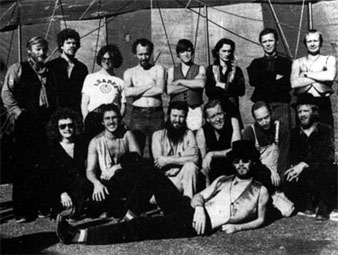
Riccardo Venturi, 14-3-2019 02:37

Tältprojektet 1977.
MAI PIÙ GUERRA
Posso salutare da una trincea nelle Fiandre
oppure da un cratere vicino a Gallipoli
da quattro anni d'orrore a fianco del Morto Vivente [1]
da parte di tutti i combattenti della Somme
Da parte di tutti quelli ammazzati in Galizia
e di tutti i sopravvissuti a un attacco al gas sulla Marna
un saluto dall'inferno di Passchendale
e da una palude fangosa vicino a Tannenberg
Vi saluto da parte di dodici milioni di morti:
Mai più guerra!
Tra vent'anni il fronte occidentale sarà storia
e sul paesaggio di morte crescerà di nuovo l'erba
i ciechi per il gas riceveranno rose da Victoria [2]
e gli eroi diventeranno dei vecchi dimenticati.
Io, sopravvissuto agli orrori della guerra
non grido hurrà nel momento vibrante della pace
perché vado in stracci verso l'avvenire
e lo osservo con occhi che si sono spenti
Vi saluto da parte di dodici milioni di morti:
Mai più guerra!
E anche se il fronte occidentale è stato il luogo
dove la gioventù d'Europa è stata martellata a morte
non faranno in tempo gli alberi a sbocciare
che nuovi piani di guerra saranno alimentati.
Perché il capitale non conosce confini
E so che tra vent'anni si ripunterà là
E allora riprenderò zaino e fucile
e allora ripartirò e morirò per il suo profitto.
Vi saluto da parte di dodici milioni di morti:
Mai più guerra!
Posso salutare da una trincea nelle Fiandre
oppure da un cratere vicino a Gallipoli
da quattro anni d'orrore a fianco del Morto Vivente [1]
da parte di tutti i combattenti della Somme
Da parte di tutti quelli ammazzati in Galizia
e di tutti i sopravvissuti a un attacco al gas sulla Marna
un saluto dall'inferno di Passchendale
e da una palude fangosa vicino a Tannenberg
Vi saluto da parte di dodici milioni di morti:
Mai più guerra!
Tra vent'anni il fronte occidentale sarà storia
e sul paesaggio di morte crescerà di nuovo l'erba
i ciechi per il gas riceveranno rose da Victoria [2]
e gli eroi diventeranno dei vecchi dimenticati.
Io, sopravvissuto agli orrori della guerra
non grido hurrà nel momento vibrante della pace
perché vado in stracci verso l'avvenire
e lo osservo con occhi che si sono spenti
Vi saluto da parte di dodici milioni di morti:
Mai più guerra!
E anche se il fronte occidentale è stato il luogo
dove la gioventù d'Europa è stata martellata a morte
non faranno in tempo gli alberi a sbocciare
che nuovi piani di guerra saranno alimentati.
Perché il capitale non conosce confini
E so che tra vent'anni si ripunterà là
E allora riprenderò zaino e fucile
e allora ripartirò e morirò per il suo profitto.
Vi saluto da parte di dodici milioni di morti:
Mai più guerra!
[1] Il riferimento è al famoso Attacco dei Morti Viventi alla fortezza di Osowiec (Ossowitz), uno degli episodi più incredibili e terribili della I guerra mondiale.
[2] Qui “Victoria” simboleggia esattamente la “Vittoria”. In molti paesi vincitori della I guerra mondiale, ragazze abbigliate da “vittoria” lanciavano e distribuivano rose e altri fiori ai soldati reduci dalla guerra che sfilavano in parata.
[2] Qui “Victoria” simboleggia esattamente la “Vittoria”. In molti paesi vincitori della I guerra mondiale, ragazze abbigliate da “vittoria” lanciavano e distribuivano rose e altri fiori ai soldati reduci dalla guerra che sfilavano in parata.
Language: English
English translation / Engelsk översättning / Traduzione inglese / Traduction anglaise / Englanninkielinen käännös:
Riccardo Venturi, 14-3-2019 02:38
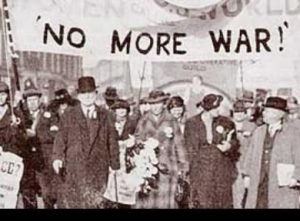
Riccardo Venturi, 14-3-2019 02:38

NO MORE WAR!
I can greet you from a trench in Flanders
Or from a crater just around Gallipoli
From four years' horror by the Dead Man [1]
From all those who fought in the battle of Somme
From all those who were slaughtered in Galicia
From all survivors of a gas attack by Marne
Greetings from the hell of Passchendale
and from a muddy marsh in Tannenberg
Greetings from twelve million victims:
No more war!
In twenty years, the West Front will be history
And grass will grow again on that landscape of death
The blind by gas will be given roses by Victoria [2]
And the heroes will grow old, forgotten men
I who survived the horrors of war
Don't cry hurra now quivering with peace coming,
For ragged am I looking towards the years to come
With my eyes that know light no more.
Greetings from twelve million victims:
No more war!
And though the West Front was the place
Where Europe's youth was hammered to death,
You won't see the first buds opening on the trees
Ere plans for a new war are drawn up.
For Capital knows no limits, and I know
It will be aiming at this again in twenty years;
Then I shall take again my gun and pack,
And I shall leave and die for its profit.
Greetings from twelve million victims:
No more war!
I can greet you from a trench in Flanders
Or from a crater just around Gallipoli
From four years' horror by the Dead Man [1]
From all those who fought in the battle of Somme
From all those who were slaughtered in Galicia
From all survivors of a gas attack by Marne
Greetings from the hell of Passchendale
and from a muddy marsh in Tannenberg
Greetings from twelve million victims:
No more war!
In twenty years, the West Front will be history
And grass will grow again on that landscape of death
The blind by gas will be given roses by Victoria [2]
And the heroes will grow old, forgotten men
I who survived the horrors of war
Don't cry hurra now quivering with peace coming,
For ragged am I looking towards the years to come
With my eyes that know light no more.
Greetings from twelve million victims:
No more war!
And though the West Front was the place
Where Europe's youth was hammered to death,
You won't see the first buds opening on the trees
Ere plans for a new war are drawn up.
For Capital knows no limits, and I know
It will be aiming at this again in twenty years;
Then I shall take again my gun and pack,
And I shall leave and die for its profit.
Greetings from twelve million victims:
No more war!
[1] Reference is made to the well known Attack of the Dead Men in Osowiec (Ossowitz) fortress, among the most incredible and terrible episodes in WW1.
[2] Here, “Victoria” stands for “Victory”. In many countries among WW1 winners, girls dressed in “victory” threw roses or other flowers at the soldiers parading.
[2] Here, “Victoria” stands for “Victory”. In many countries among WW1 winners, girls dressed in “victory” threw roses or other flowers at the soldiers parading.
Language: Finnish
Traduzione finlandese / Finnish translation / Traduction finnoise / Finsk översättning / Suomennos: Juha Rämö
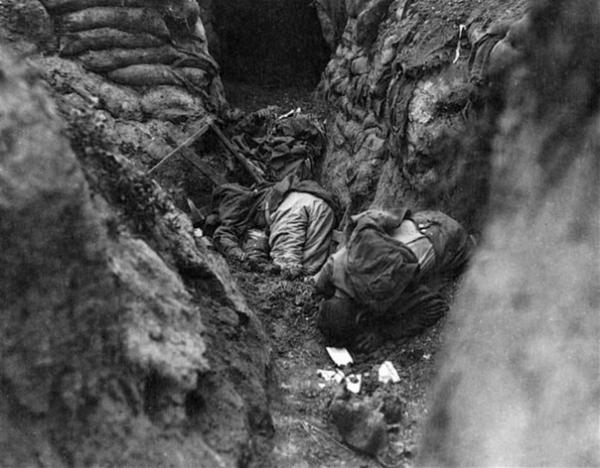

EI KOSKAAN ENÄÄ SOTAA
Tuon terveiset Flanderin juoksuhaudoista
ja pommikuopasta Gallipoli luona,
Osowiecin neljän kauhun vuoden terveiset
ja terveiset kaikilta meiltä Sommessa taistelleilta.
Kaikilta meiltä, jotka taistelimme Galitsiassa
ja jotka selvisimme Marnen kaasuhyökkäyksestä,
terveiset Passendalen helvetistä
ja mutaiselta Tannebergin suolta.
Tuon teille 12 miljoonan kuolleen terveiset:
Ei koskaan enää sotaa!
Kahdenkymmenen vuoden päästä länsirintama on historiaa
ja ruoho kasvaa jälleen kuoleman mailla,
kaasun sokeuttamat saavat voiton ruusuja,
ja sankareista tulee vanhoja unohdettuja miehiä.
Ja minä, joka olen selvinnyt hengissä sodan kauhuista,
en huuda riemusta rauhan värisyttävällä hetkellä,
sillä minä kuljen kohti tulevaisuutta rääsyissä
ja katson sitä sammunein silmin.
Tuon teille 12 miljoonan kuolleen terveiset:
Ei koskaan enää sotaa!
Ja vaikka juuri länsirintamalla
Euroopan nuoriso moukaroitiin kuoliaaksi,
niin tuskin ovat puiden silmut avautuneet,
kun jo uudet suunnitelmat ovat tekeillä.
Ja koska pääoma ei tunne rajoja,
tiedän, että kun käsky jälleen käy 20 vuoden kuluttua,
tartun aseeseeni ja reppuuni
ja lähden kuolemaan sen puolesta.
Tuon teille 12 miljoonan kuolleen terveiset:
Ei koskaan enää sotaa!
Tuon terveiset Flanderin juoksuhaudoista
ja pommikuopasta Gallipoli luona,
Osowiecin neljän kauhun vuoden terveiset
ja terveiset kaikilta meiltä Sommessa taistelleilta.
Kaikilta meiltä, jotka taistelimme Galitsiassa
ja jotka selvisimme Marnen kaasuhyökkäyksestä,
terveiset Passendalen helvetistä
ja mutaiselta Tannebergin suolta.
Tuon teille 12 miljoonan kuolleen terveiset:
Ei koskaan enää sotaa!
Kahdenkymmenen vuoden päästä länsirintama on historiaa
ja ruoho kasvaa jälleen kuoleman mailla,
kaasun sokeuttamat saavat voiton ruusuja,
ja sankareista tulee vanhoja unohdettuja miehiä.
Ja minä, joka olen selvinnyt hengissä sodan kauhuista,
en huuda riemusta rauhan värisyttävällä hetkellä,
sillä minä kuljen kohti tulevaisuutta rääsyissä
ja katson sitä sammunein silmin.
Tuon teille 12 miljoonan kuolleen terveiset:
Ei koskaan enää sotaa!
Ja vaikka juuri länsirintamalla
Euroopan nuoriso moukaroitiin kuoliaaksi,
niin tuskin ovat puiden silmut avautuneet,
kun jo uudet suunnitelmat ovat tekeillä.
Ja koska pääoma ei tunne rajoja,
tiedän, että kun käsky jälleen käy 20 vuoden kuluttua,
tartun aseeseeni ja reppuuni
ja lähden kuolemaan sen puolesta.
Tuon teille 12 miljoonan kuolleen terveiset:
Ei koskaan enää sotaa!
Flander, Gallipoli, Osowiec, Somme, Galitsia, Marne, Passendale ja Tanneberg ovat kaikki ensimmäisen maailmansodan taistelupaikkoja. Nykyisen Puolan koillisosassa sijaitsevasta Osowiecin linnoituksesta käytiin venäläisten puolustajien ja saksalaisten hyökkääjien välillä 1914 - 1915 ankara taistelu. Venäläisten viimeinen epätoivoinen yritys torjua vihollisen aikeet tunnetaan historiassa nimellä »kuolleen miehen hyökkäys, venäjäksi Атака мертвецов.
Contributed by Juha Rämö - 2019/3/14 - 13:42
×
![]()
Note for non-Italian users: Sorry, though the interface of this website is translated into English, most commentaries and biographies are in Italian and/or in other languages like French, German, Spanish, Russian etc.

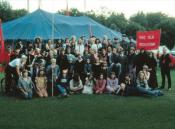
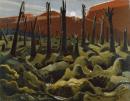
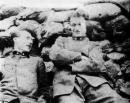



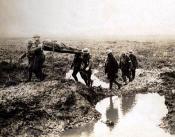
Text och musik / Testo e musica / Lyrics and music / Paroles et musique / Sanat ja sävel: Ulf Dageby - Peter Wahlqvist
Sjunger / Canta / Singing / Chante / Laulaa: Totta Näslund (1945-2005)
Album / Albumi: Vi äro tusenden [1977]
Una canzone rock (scritta da Ulf Dageby e Peter Wahlqvist, e interpretata da Totta Näslund) scritta nel 1977 per il Tältprojekt (“Progetto nei tendoni”, o “teatri tenda”). La canzone ha avuto un suo secondo momento di notorietà nel 2001, quando fu ripresa dal movimento altermondialista svedese che si espresse particolarmente a Göteborg.
Il Tältprojekt, chiamato anche Vi äro tusenden (“Siamo in migliaia”, espressione ripresa dal Vi bygger landet, il principale inno socialista dei paesi nordici), è stato un'importante rappresentazione teatrale e musicale della sinistra svedese, che fu portata in tutta la Svezia e in Danimarca nel 1977. Si trattava della messa in scena di tutta la storia del movimento operaio svedese.
Il Tältprojekt effettuò una tournée di quattro mesi e mezzo in 31 località svedesi e danesi, per un totale di 82 rappresentazioni. Vi collaborarono molti dei più importanti artisti e gruppi svedesi teatrali e musicali dell'epoca impegnati nell'ambito della sinistra, tra i quali Nationalteatern, Nynnigen, Oktober, Tidningsteater e Narren. Tra gli attori che parteciparono al progetto vi furono Sven Wollter, Totta Näslund (che canta questa canzone), Eva Remaeus, Henric Holmberg, Christer Boustedt, Sonja Lund, Johannes Brost, Marianne Lindberg De Geer e Björn Granath.
Ulf Dageby e Nationalteatern scrissero molte delle canzoni presentate, tra le quali le due principali: Vi äro tusenden e questa. La rappresentazione fu vista da circa centomila spettatori e fu incisa su LP (1977) e, in seguito, anche su CD (1993). Alcune sue parti e gli eventi che si svolsero durante la tournée formarono l'oggetto di un documentario del 1978 di Göran du Rées e Christina Olofson, intitolato Tältet – Vem tillhör världen? (“Il tendone – A chi appartiene il mondo?”)
La canzone che qui viene presentata appartiene al periodo della I guerra mondiale che viene preso in rassegna durante la rappresentazione. Sono i “saluti” di un “soldato collettivo” sopravvissuto a tutti i principali orrori della guerra (le Fiandre, Osowiec, Gallipoli, la Somme, la Marna, Tannenberg...). Diventato cieco per gli attacchi al gas tossico, si rifiuta di esultare una volta giunta la pace: il suo futuro è di miseria e i suoi occhi si sono spenti. Gli “occhi spenti” sono una perfetta metaforia per tutto quel che già egli sa, e che tutti sanno: entro vent'anni tutto sarebbe accaduto di nuovo, ed in modo ancor peggiore.
Il titolo è, naturalmente, ripreso dallo slogan mondiale innalzato in tutte le manifestazione susseguitesi alla fine della “Guerra che doveva far finire le guerre”: “Mai più guerra!” “Nie wieder Krieg!” “No more war!” “Guerre plus jamais!”, e così via. [RV]
Aldrig mera krig är en rocklåt skriven av Ulf Dageby och Peter Wahlqvist och framförd av Totta Näslund i musikföreställningen Tältprojektet från 1977. Sången handlar om Första världskriget. Sången har även spelats in med Svenska musikrörelsen 2001.
En klassisk låt ur det lika klassiska Tältprojektet. Totta Näslund sjunger, Christer Boustedt spelar saxofon, låten är skriven av Ulf Dageby och Peter Wahlqvist. Hämtad ur "Tältet - vem tillhör världen?" av Christina Olofson och Göran du Rées.
Tältprojektet, även kallat Vi äro tusenden, var en stor musikalisk och vänsterpolitisk teaterföreställning som turnerade i Sverige och Danmark i mitten av 1977 och framförde en dramatisering av den svenska arbetarrörelsens historia. Tältprojektet pågick under fyra och en halv månad. Turnén besökte 31 platser och spelade 82 föreställningar.
Flera av tidens mest framträdande artister och grupper med koppling till den politiska musikrörelsen i Sverige medverkade, till exempel Nationalteatern, Nynningen, Oktober, Tidningsteatern och Narren. Bland de medverkande skådespelarna fanns Sven Wollter, Totta Näslund, Eva Remaeus, Henric Holmberg, Christer Boustedt, Sonja Lund, Johannes Brost, Marianne Lindberg De Geer och Björn Granath.
Ulf Dageby och Nationalteatern skrev många av de sånger som framfördes, framför allt de två huvudnumren "Vi äro tusenden" och "Aldrig mera krig" (båda framförda av Totta Näslund, text av Peter Wahlqvist och musik av Ulf Dageby).
Föreställningen, som sågs av över 100 000 människor, gavs ut på LP-skiva (1977) och senare även på CD (1993). Delar av föreställningen och händelser under turnén finns dokumenterade i dokumentärfilmen Tältet (1978), som gjordes av Göran du Rées och Christina Olofson.
Marianne Lindberg De Geer gjorde 2005 en dokumentärfilm, Jag tänker på mig själv – och vänstern, om 1977 års tältprojekt där hon intervjuade många av de inblandade.
Tältprojektet – The Tent Project (Sweden, 1977) was a musical theater performance on the history of the Swedish working class, which toured the country the summer of 1977 in a huge circus tent. The group included over 100 people, musicians, actors, and members of some of the biggest progg bands of Sweden at the time, most notable Nationalteatern. The Tent Project was a radical, leftist political movement, but it included different political groups from anarchists to different types of communists and socialists.
The story of the approximately four-hour play was on the history of the Swedish working class movement from 1879 to the present (1977), and the cast of characters included August Palm, Kata Dalström, Hjalmar Branting and Zeth Höglund. The central story telling character was the beggar, played by Totta Näslund. Another major role was played by Sven Wollter who, as the clown, was sort of the host of the show. Most of the songs performed in the Tent Project were written by Ulf Dageby.
The tour made 82 performances, and over 100,000 people went to see the show, as it toured through almost every city in Sweden and some in Denmark. Some of the songs were later released on a LP.
Some of the most notable songs from Tältprojektet are Aldrig mera krig (Never War Again) and Vi äro tusenden (We are thousands), both sung by Totta Näslund and written by Ulf Dageby.